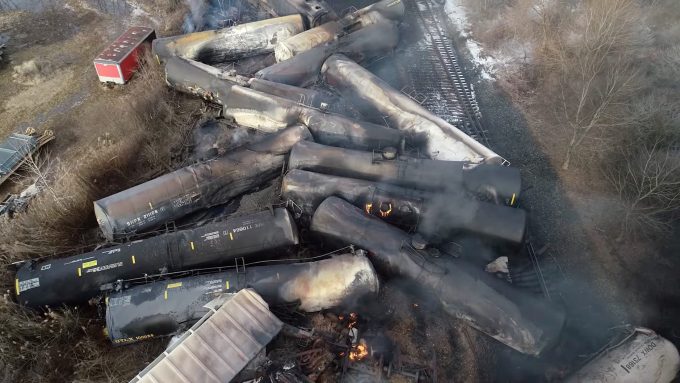BNSF maintenance cuts prompt further US rail safety warning
Divisions remain deep between US rail labour and management, with accusations that the latter is ...
GM: RAISING THE ROOF GGM: IN FULL THROTTLE GZIM: MAERSK BOOST KNIN: READ-ACROSSMAERSK: NOT ENOUGHMAERSK: GUIDANCE UPGRADEZIM: ROLLERCOASTERCAT: HEAVY DUTYMAERSK: CATCHING UP PG: DESTOCKING PATTERNSPG: HEALTH CHECKWTC: THE FALLGXO: DEFENSIVE FWRD: RALLYING ON TAKEOVER TALKODFL: STEADY YIELDVW: NEW MODEL NEEDEDWTC: TAKING PROFIT
GM: RAISING THE ROOF GGM: IN FULL THROTTLE GZIM: MAERSK BOOST KNIN: READ-ACROSSMAERSK: NOT ENOUGHMAERSK: GUIDANCE UPGRADEZIM: ROLLERCOASTERCAT: HEAVY DUTYMAERSK: CATCHING UP PG: DESTOCKING PATTERNSPG: HEALTH CHECKWTC: THE FALLGXO: DEFENSIVE FWRD: RALLYING ON TAKEOVER TALKODFL: STEADY YIELDVW: NEW MODEL NEEDEDWTC: TAKING PROFIT

At least one new law has been made following the February derailment in East Palestine, Ohio – it forces rail carriers to provide local emergency services with a complete inventory of hazardous cargo.
Kicking off today, a two-day hearing is being held involving National Transportation Safety Board (NTSB) members, Norfolk Southern and chemical company executives, the Federal Railroad Administration, Ohio National Guard and local emergency services members testifying under oath.
Open to the East Palestine public and livestreamed on the NTSB YouTube channel, the hearing will investigate the causes of the incident, the emergency response and communications between Norfork Southern and the authorities, and the decision to burn five derailed tank cars.
Some 38 cars were derailed in the Norfolk Southern incident, which subsequent NTSB reports have attributed to a failed wheel bearing. Eleven were carrying toxic chemicals vinyl chloride, ethyl acrylate and isobutylene.
While cars were vented and burned following the crash in the hope of containing the contents, this instead sent a plume of noxious black smoke into the air. Months later, homes remain uninhabitable, groundwater has been poisoned, more than 45,000 animals have died and residents report recurring symptoms, including nausea, coughing fits and nosebleeds.
“My seven-year-old has asked me if he is going to die from living in his own home. What do I tell him?” demanded East Palestine resident Misti Allison at a March community meeting.
There are signs that the massive onset of public scrutiny will bring about the end of ‘precision scheduled railroading’ (PSR), a highly profitable and much-criticised business model that cuts down on engineers and safety inspections, encourages fewer and longer trains, which cannot use sidings to escape a collision, and writes off the thousands of US derailments each year as ‘a cost of doing business’.
“The communities most affected by this tragedy deserve as much insight as possible into our investigation, which is why we’re holding an investigative hearing in East Palestine,” said NTSB chair Jennifer Homendy.
“While we unfortunately cannot change what happened that day, our entire agency is committed to carrying out our mission, which doesn’t end when we get to the bottom of what happened, and why it happened. We’ll also work vigorously to prevent it from ever happening again.”
Comment on this article